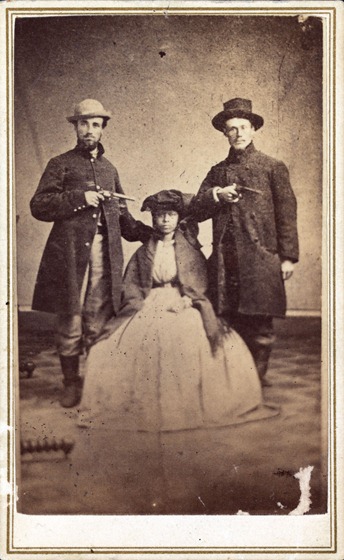 Sunday, Sept. 7., (Vicksburg, Washington Hotel)—H. did not return for three weeks. An epidemic disease broke out in his uncle’s family and two children died. He staid to assist them in their trouble. Tuesday evening he returned for me and we reached Vicksburg yesterday. It was my first sight of the “Gibraltar of the South.” Looking at it from a slight elevation suggests the idea that the fragments left from world-building had tumbled into a confused mass of hills, hollows, hillocks, banks, ditches, and ravines, and that the houses had rained down afterwards. Over all there was dust impossible to conceive. The bombardment has done little injury. People have returned and resumed business. A gentleman asked H. if he knew of a nice girl for sale. I asked if he did not think it impolitic to buy slaves now.
Sunday, Sept. 7., (Vicksburg, Washington Hotel)—H. did not return for three weeks. An epidemic disease broke out in his uncle’s family and two children died. He staid to assist them in their trouble. Tuesday evening he returned for me and we reached Vicksburg yesterday. It was my first sight of the “Gibraltar of the South.” Looking at it from a slight elevation suggests the idea that the fragments left from world-building had tumbled into a confused mass of hills, hollows, hillocks, banks, ditches, and ravines, and that the houses had rained down afterwards. Over all there was dust impossible to conceive. The bombardment has done little injury. People have returned and resumed business. A gentleman asked H. if he knew of a nice girl for sale. I asked if he did not think it impolitic to buy slaves now.
“Oh, not young ones. Old ones might run off when the enemy’s lines approach ours, but with young ones there is no danger.”
We had not been many hours in town before a position was offered to H. which seemed providential. The chief of a certain department was in ill-health and wanted a deputy. It secures him from conscription, requires no oath, and pays a good salary. A mountain seemed lifted off my heart.
![]()
______
Note: To protect Mrs. Miller’s job as a teacher in New Orleans, the diary was published anonymously, edited by G. W. Cable, names were changed and initials were often used instead of full names — and even the initials differed from the real person’s initials.



